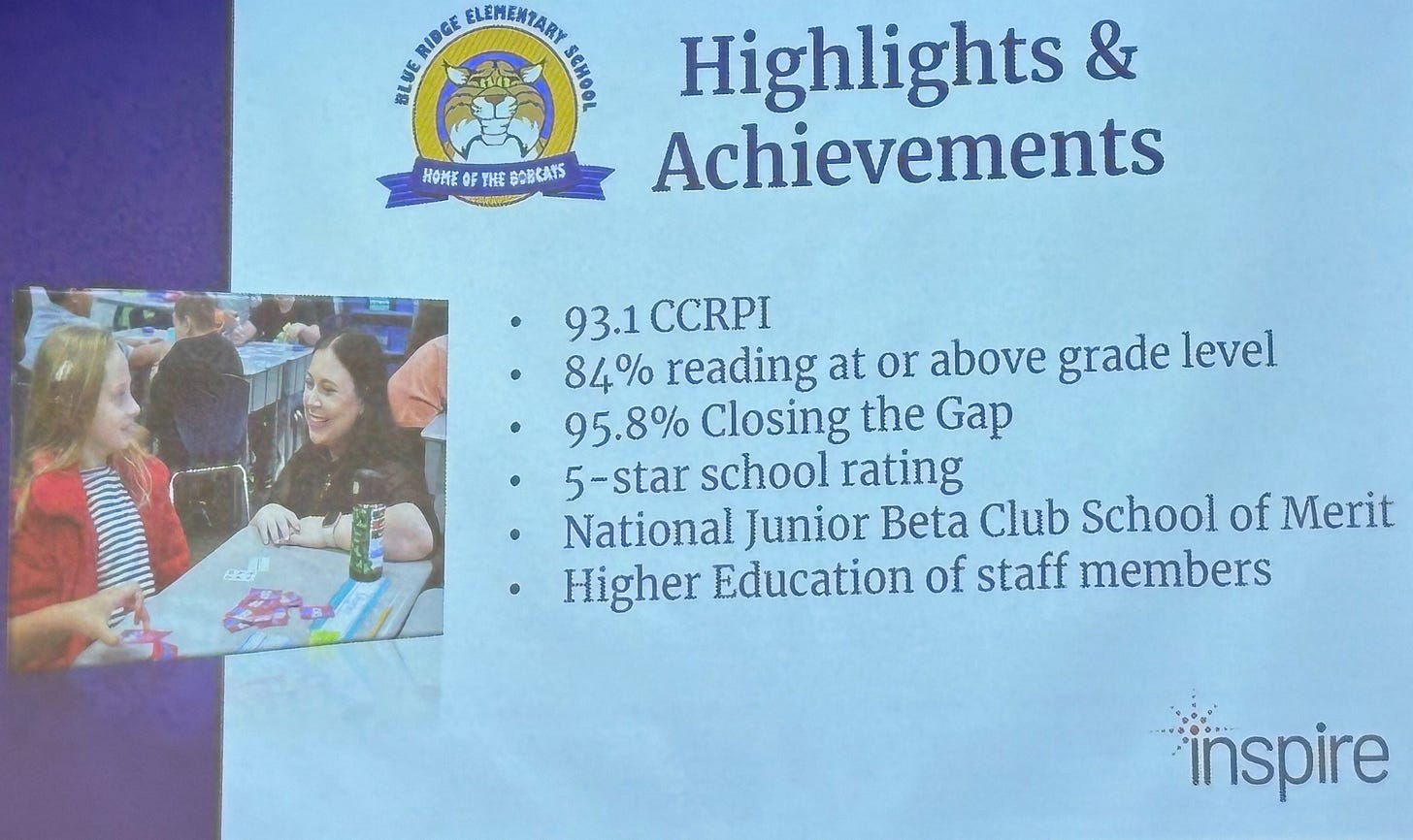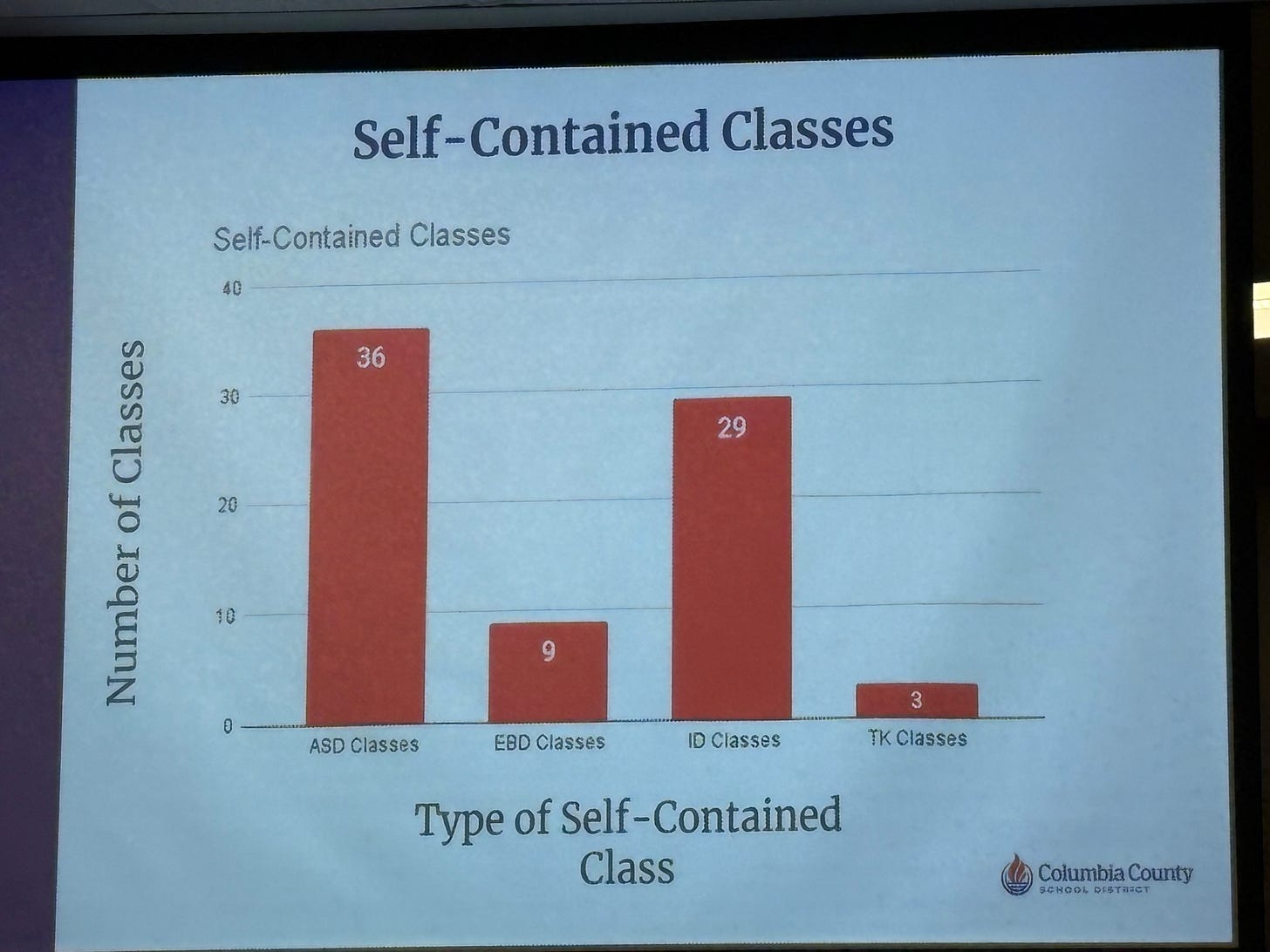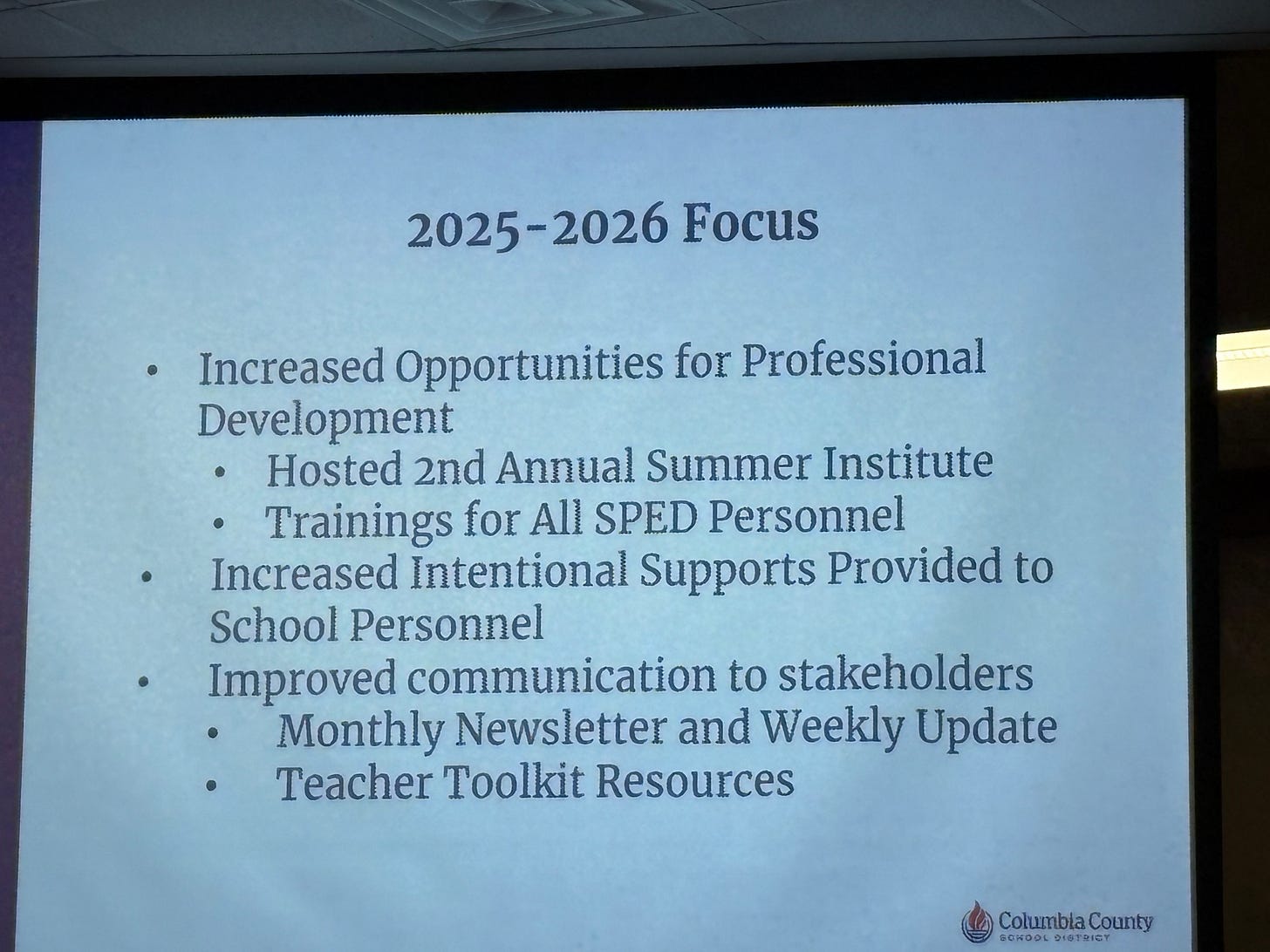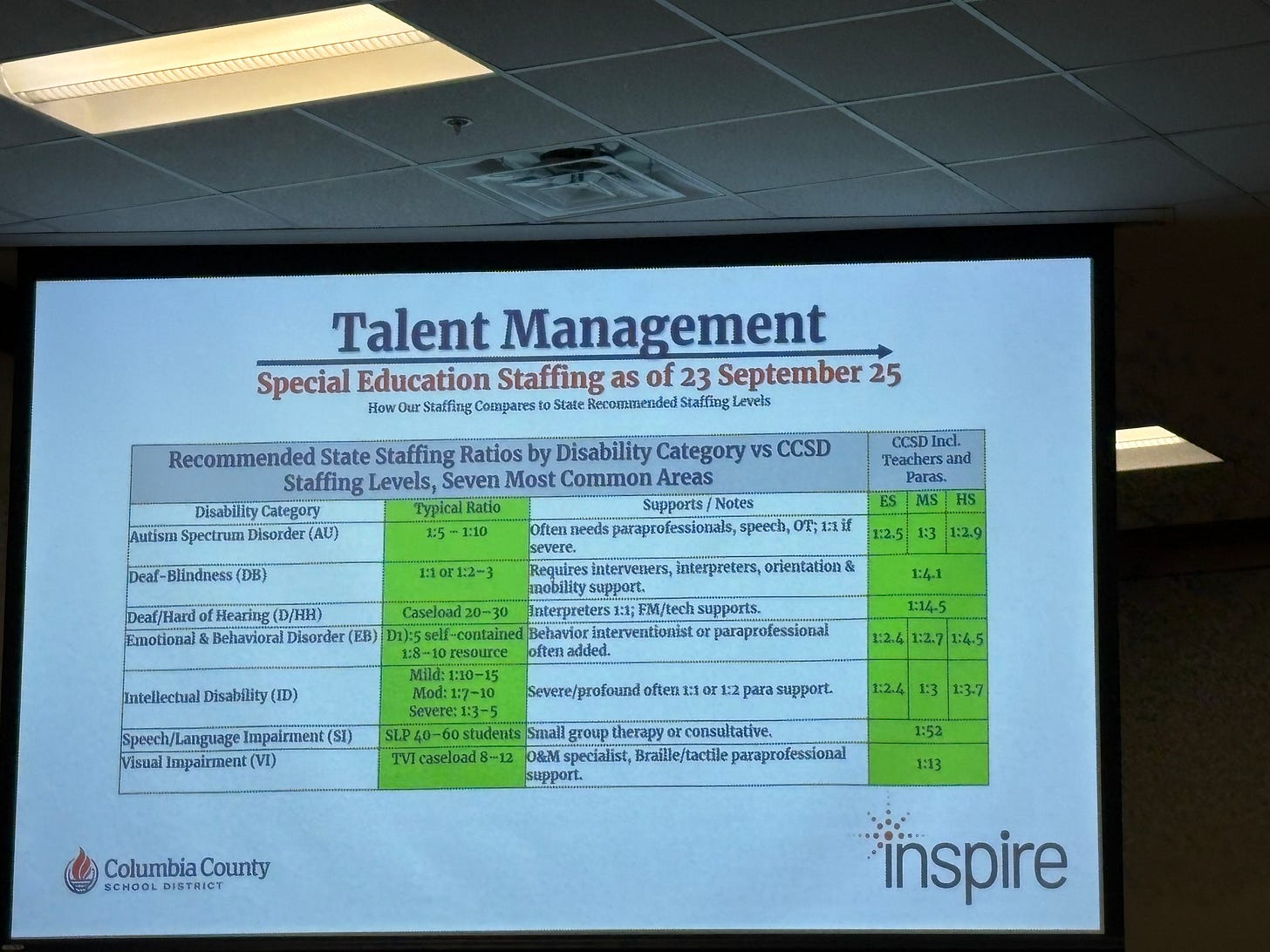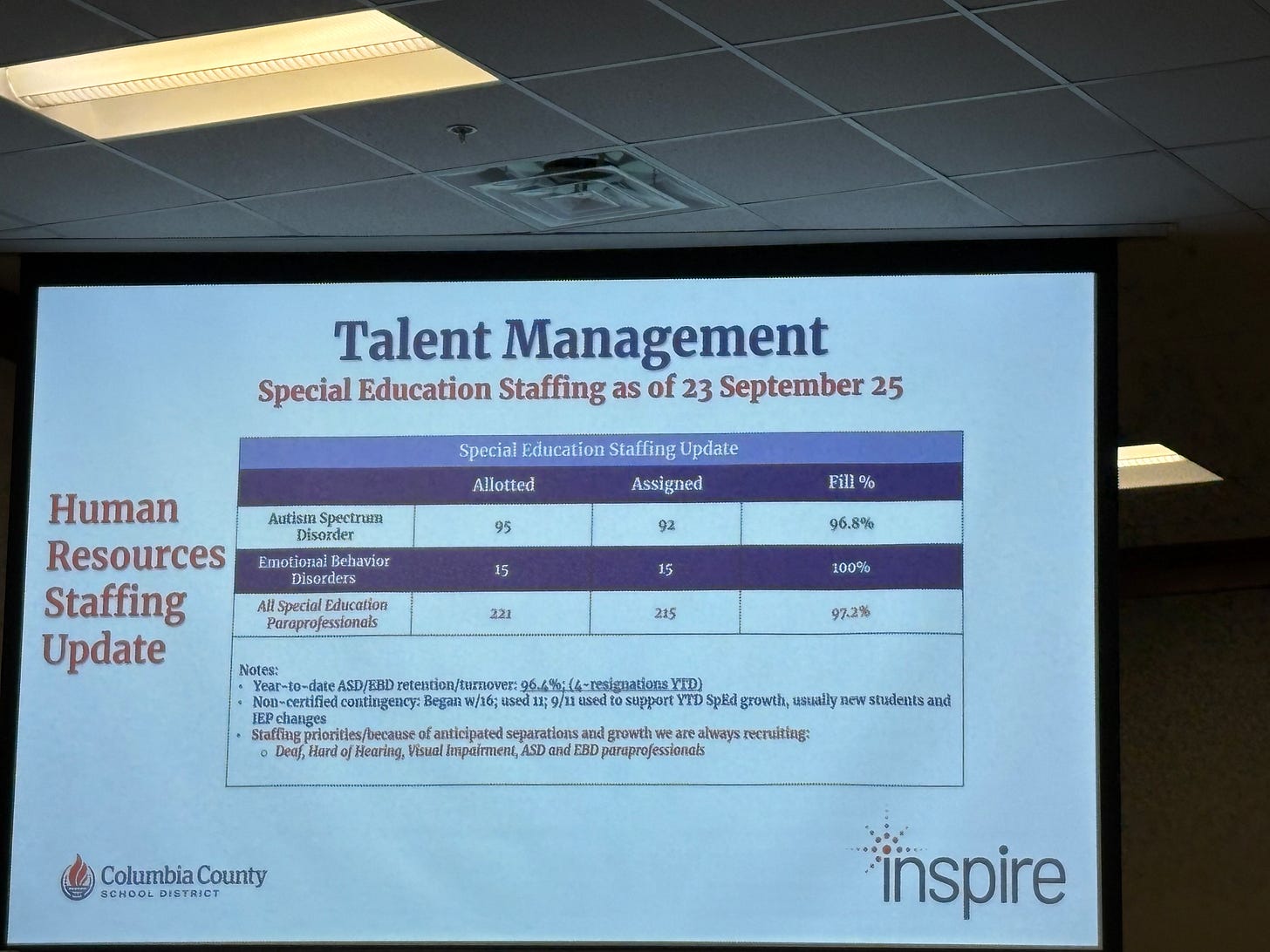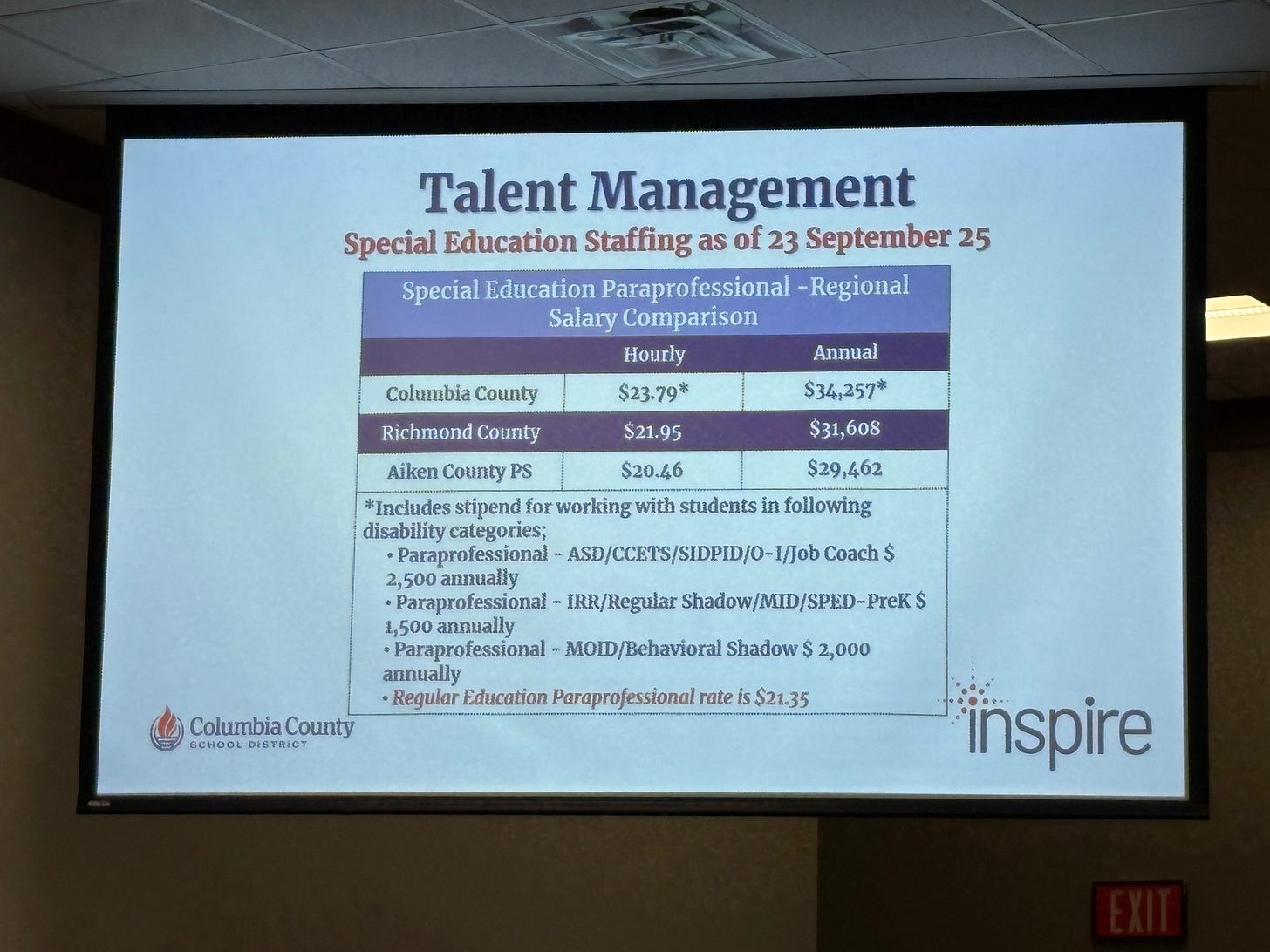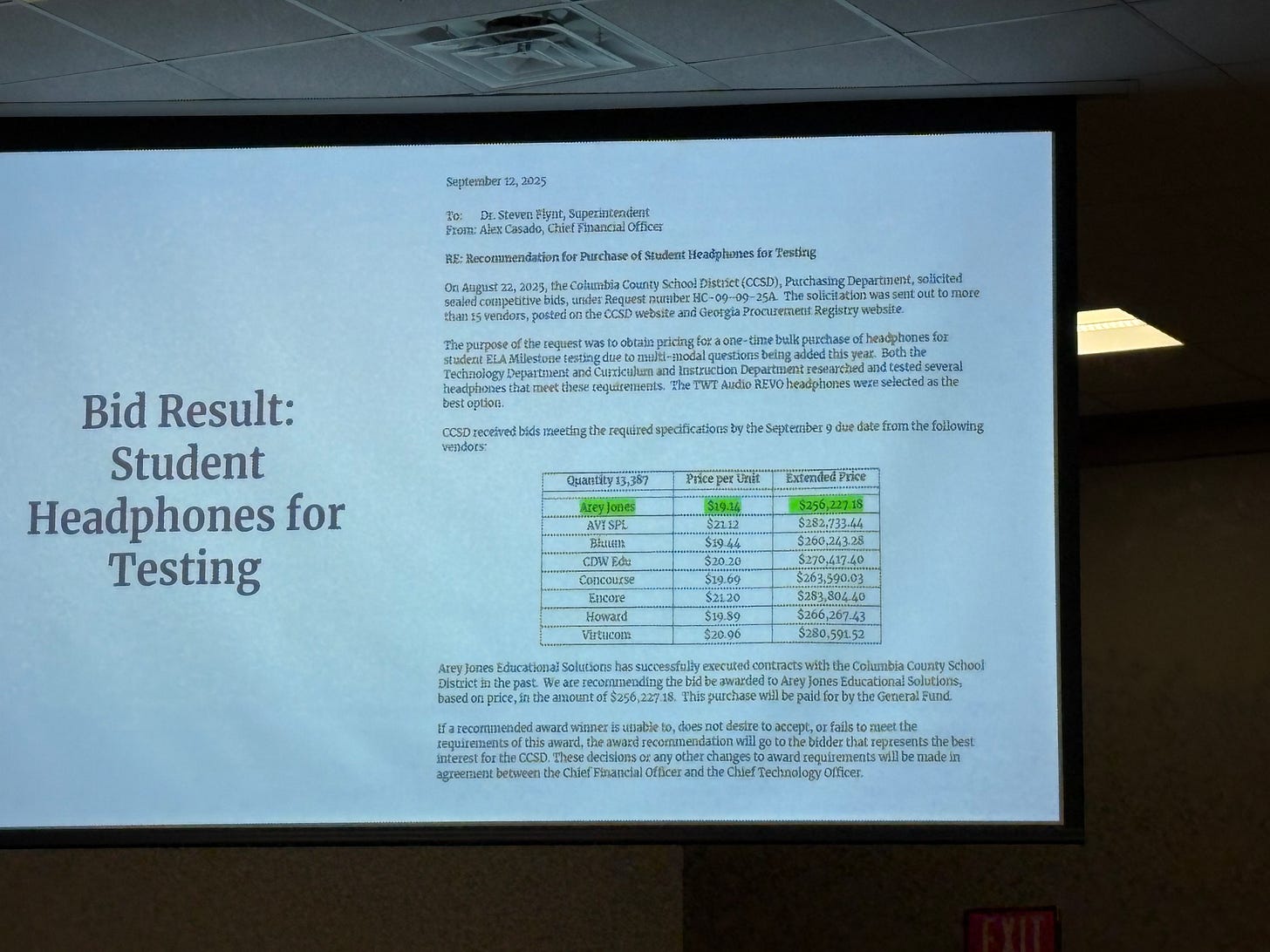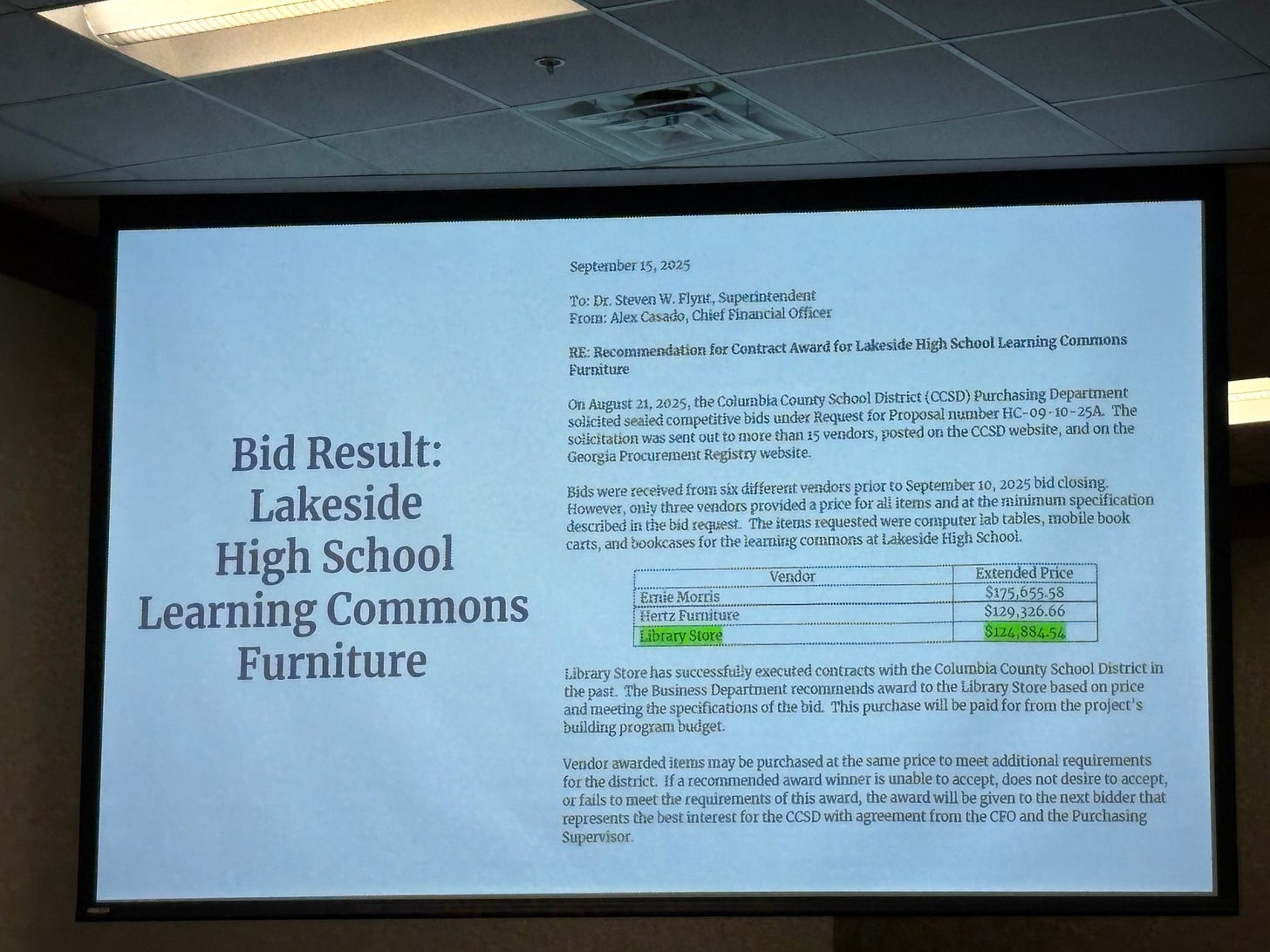Call To Order: 5:30PM
Invocation: St. Teresa of Avila Catholic Church Deacon Glen Garrison
Pledge of Allegiance: Euchee Creek Elementary School 4-H Presidents
Approval of Agenda: Yay 4, No 1 (Katie Allen)
Special Recommendation:
Grovetown Elementary School Principal - Latoya Jackson Barnett. Approve: Yay 5, No 0
Special Recognitions
Columbia County Exchange Club Freedom Shrines
Drum Corps International
Lakeside High School
Hendrick Chitty
Rand Sayno
Harlem High School
Aiden McMullen
Kiernan McMullen
Greenbrier High School
Rigel Kotas
Marcus Snyder
Board Comments: All board members congratulated Ms. Latoya Jackson Barnett. All thanked Deacon Glen Garrison for invocation. Thanked the exchange club for the Freedom Shrines in the schools. Thanked student drummers and 4-H students.
Consent Items: Board approved items C-F (approve: Yay 5, No 0) and pulled items A & B for debate because Katie Allen wanted to address them.
C. Fundraisers
D. Employee Travel
E. Program/Camp/Employee Participation Request
F. Lease/Use of Facilities
September 9, 2025 Regular Session Meeting Minutes. (Approve: Yay 4, No 1 (Kristi Baker))
Katie Allen was concerned that the discussion regarding challenging media center materials was not on the meeting minutes.
Dekle: Asked if [Allen] was making a motion to amend the minutes?
Allen: Made a motion to amend the minutes to include the discussion and presentation about media center policies and procedures. Asked about where in the minutes the presentation would be placed.
Flynt: It wasn’t added to the minutes because there wasn’t anything actionable. There were many constituent questions about it, so decided to present the information. Usually those types of things are included under Superintendent Reports for School Year Updates.
August Financials: (Approve: Yay 5, No 0)
Allen noticed a difference in revenue from July to August. July for local sources $157 million. August financials say $153 million. Asked if there was a budget amendment document?
Casado: The difference in revenue is from changing the millage to the rollback rate. I believe there was an amended budget in the consent items a couple months ago when you voted to roll the millage rate back.
Allen: Is there a way to communicate the budget changes to the public?
Dekle: No need to change it. It’s available to the public and you have the documents too.
Inspire School Spotlight, Associate Superintendent Kristen Carroll and Assistant Principal of Blue Ridge Elementary School Jessica Williams
Special Education Update, Chief Academic Officer LeAnne Gregg and Director of Special Education Sharard Pritchett
MTSS: 3 Tiers of intervention before evaluation for Special Education
IDEA: Free Access to Public Education (FAPE) in least restrictive environment. Services driven by data and tailored to students’ unique needs
IEP Team: Teachers, school personnel, service providers, parents and student (older students).
Reviewed annually, can be modified more than annually if necessary. Evaluation every 3 years or sooner if necessary.
Funding: maximize funding FTE to increase revenue. Able to provide additional staffing/resources. Providing higher support.
+$12 million increase over past 4 years, above and beyond.
Average expenditure increased by $2300/pupil
2 Examples of going beyond:
State Max teacher/student ratio is 14. Columbia county average is 11 students/teacher.
State Max for LD is 26. Columbia County average is 15.
18% of students with disabilities are in self-contained classrooms
ASD: Autism Spectrum Disorder
EBD: Emotional Behavior Disorder
ID - Functional Skills
T.K. - Transitional Kindergarten
2023-2024 External Audit Needs Assessment
3 Areas: Instruction, Compliance, Behavior
2024-2025
Began addressing issues by improving ACE w/ district resources, planning opportunities, Compliance (IEP Meetings, additional staff training), Behavior (class structure, staff training)
2025-2026
Restructure
5 clusters
Specialization of positions: Instruction Specialists, Behavior Specialists, Program Specialists
Rotation Schedule
Allen: There was an issue with an IEP being altered without a parent’s knowledge or consent. What steps have we taken to see if this has happened to other IEPs?
Pritchett: We use the guidance we’ve received with IEP agendas in IEP meetings to make sure that doesn’t happen.
Allen: Have we looked through to make sure they didn’t happen to other IEPs or what have we done. Have we done a review of some sort?
Pritchett: Well, we do the reviews and that’s one of the line items for our compliance specialists. They go in and review those IEPs and support our teachers to ensure that we’re compliant.
Allen: And I know the district recently changed its practice to no longer allow third party special education supports. If a child does need this third party support that is listed in their IEP and the district is not able to provide it. What’s our way forward for the district assisting parents to ensure the child has provided that service?
Pritchett: Well, again, that’s on an individual basis and determining if a service or support is needed for a student to asset state and the team, you know, reviewing that data and making that decision. And if there’s a need for a student, then, you know, we provide that to that student, that service or support.
Allen: So if it’s in their IEP already and it’s determined they need it, how do we provide that if we’re not networking with third party providers anymore?
Pritchett: That’s, that’s more so hypothetical. So I mean.
Allen: Well, it did happen. That’s why I’m asking.
Pritchett: Well, I can’t speak to individual information here in the board meeting.
Teasley: So to recap, Special Education students are 13% of our population. We have 258 teachers for Special Ed and they are spread out across different programs to meet the individual needs of those students.
Allen: Is the parent mentor vacant?
Pritchett: It’s filled. The grant was approved over the summer in July and it was filled by August. He’s excited for the new parent mentor.
Baker: Was there a liaison before?
Pritchett: Yes, before.
Allen: How long was the gap between when the liaison left and the parent mentor started?
Pritchett: More of a personnel issue….
Kent: There are always complaints with IEPs. Is there anyway to measure if the new restructuring has less or more complaints? Can you show a reduction of complaints?
Gregg: We just started this new structure, only about 5 1/2 weeks into it. It’s difficult to measure reductions in complaints. We’ve gotten positive feedback and we feel good about it. We’re making adjustments too.
Teasley: Is it difficult to find Special Education personnel?
Pritchett: Mr. Wright will speak to that.
(The following is transcribed)
Allen: I want to be completely honest. I’m seeing a disjunct between just a full disconnect between what I’m seeing in the slides and what the public has brought to me. I’ve had a number of parents reaching out with special ed concerns and you know, wanting me to bring these concerns to the meeting. And this opportunity is really the place to do it. So I did have a parent and she networked with a number of other special ed parents who felt like they couldn’t speak up and share individually because they feared retaliation. And so she combines their feedback and sent it and asked me to share with the so some of those things that she shared, you know, I won’t read all of it, but some of the main takeaways are she’s saying decisions are being made that don’t seem to have our kids best interests at heart, especially the ones with higher needs. Moving classes around, the unnecessary changes to special education specialists, making constant adjustments. If anything, this has made school harder for these students. She talks about idea complaints climbing based on her circle of parents that she knows. She says things typically went from okay in 22 to 23 to now completely out of control. Parents are crying out for help and the system is still failing our kids. She said. I saw a parent on Facebook trying to find out our parent mentor. I gave up on that search weeks ago. Since the information still isn’t on the district website when you click on the link, the page doesn’t load. The pay for ASD paraprofessionals is shameful, which I did have a Principal Echo that a while ago, says families are leaving the system in numbers because they’re being failed by our special ed program. And she says instead of collaborating with parents, the district bites us. They dig their heels in. There’s no compromise, no flexibility, no effort to meet us halfway. It feels like it’s their way or no way, and our children pay the price. So I want to continue having these discussions because we’ve got to bridge that disconnect somehow. We’re seeing one thing here or here or I’m hearing a number of things. I know I’ve witnessed the situation. I talked about when we were in that situation together, reading an IEP that said a child needed ADA supports, but yet we weren’t providing them because we don’t network with third parties anymore. I’m seeing that there’s just a disconnect. And so I would like the district to consider hosting a public question and answer session, a forum directly with the community to add for targeted feedback with questions and answers for the community for these parents to come and have an open, interactive discussion. I think this is a first step and I’m very proud this district has brought it to the meeting to allow the board to address it. And I think the next step would be that we would post or the district would host a question and answer forum directly with the public where parents can bring back their targeted features, feedback for the special ed program and their questions. So I pose that to Chairman, I…
Chairman Dekle: Have a question for the District 4 representative, the single complaining parent. First of all, how long have you had that information?
Allen: I’ve shared it with the board through email a number of times. This was a specific…
Chairman Dekle: I did not receive that. But the important question is, did you connect this parent with our district people so that they could address these concerns, or did you save them so you could bring them to this public forum and then have an opportunity to hear yourself speak?
Allen: Well, I did send them to the superintendent a number of times. And you received them? I’ve sent them CC’d the board on all these complaints.
Flynt: Have you received these? Ms. Allen? If I get a individual complaint, I will deal with that. That was what I was going to offer. Obviously, Ms. Gregg is available. Mr. Pritchett, all the specialists. All we have to do is know the parent and we’ll reach out and they’re going to get a lot of support. We get a lot of positive feedback. Now we don’t get everything right. We wouldn’t say that. But we work with parents very well and we’re very, very proud of our schools and our teachers. So, so when you have an issue, let’s please give me that individual issue. We will address it, we promise you. But we can’t err an individual’s. If it’s a. It might identify a student here. And so we have a limited number, especially in our self contained programs. We can’t do that in public.
Chairman Dekle: I would agree 100%. Dr. Flint. I think it’s totally inappropriate to come here and read the complaint of an individual parent, especially if you haven’t connected that parent and that family to the right people so that they can address these issues privately, individually, professionally and not in the public forum in order to score some type of political points. It’s to me, you know, it’s just, it’s not professional, it’s not appropriate.
Allen: I maintain that I did send these and I have sent communications and feedback every step of the way and the board’s always cc’d. And I also maintain that this parent is not an individual email. This is a collaboration of a number of parents who were afraid to speak out and who have either tried to speak out or were afraid to because they’re seeing how other parents have been responded to. And so this parent networked with them, combines their feedback, brought it to me as their representative said, please take this to the board so that we can feel heard.
Teasley: Speaking out to the board is not going to get a solution. She needs to be put in touch. Or he needs to be put in. Touch with the professionals that actually can make a difference. That’s why our norms of protocols require that we send whatever the complaint is, whatever the issue is to the people that actually do this, that we hire to do this, that can make that difference. Writing to us allows us to be the conduit to sources that can make the difference that needs to be made. Airing those differences here puts everybody in jeopardy, doesn’t get a difference made for the student that actually needs to see the difference. If a parent is unwilling to reach out to the people in the schools that actually deal with the students, it’s unlikely that they’re going to come to a town hall. If we’re going to make a difference for students, contact the individual, go to the schools, speak with the teacher, with the principal. I’ve never met a person in Columbia county schools that would not listen, that would not investigate, that would not do what needs to be done for a student in special ed, regular ed. Now, can we do everything according to everybody’s wishes? That would be wonderful if it were so, but it’s not okay as far as third party individuals go. No, we can’t bring third party individuals into a school because they have to be vetted just like everybody else. Whether it’s a parent volunteer, whether it’s a guest speaker. We need to know who’s in the building amongst our students. As a parent, I think everybody could appreciate, but I don’t think anybody is going without having their needs met. And I think our personnel makes every effort to make sure all needs are met. I think this approach is counterproductive. I think going directly to the schools, to the personnel is the best way to approach this. I think if somebody writes us, it’s imperative that we send them in that direction.
Allen: Also when individuals feel that they’ve exhausted those options, is this not the forum and the discussion to discuss where the community feedback is and integrate that into a full discussion to say, okay, we’ve got these metrics, these program outlines, we’ve got this community feedback as a board. How can we begin to bridge those two to find a solution?
Flynt: Do that one on one and take that person to the source. I’ll just make it known. Well, I think it’s important to note there are four formal processes here that parents should follow. We follow them to the T at the district. If and hopefully if they get to one of one of the three of us which is very late, if they get to one of the three of us and still it’s not resolved. There’s the state level process that is very open and we give them that information. And Mr. Pritchett, you can talk about that when we have have a disagreement. Actually we have any meeting if they will say if you disagree with this, this is the process that you follow and you can go to the state and complain and we’ll work. They’ll… the State will come back to us and if we did something wrong, they’ll tell us. And can you.
Pritchett: Yes. At each meeting parents are given parental rights and in those parental rights are procedural safeguards. If there is any disagreement with an IEP decision and it details further in a state complaint or due process as procedural safeguards for parents. And in those cases then someone from the state intervenes and does an investigation to look into the matters.
Flynt: And I would also mention if we actually went on another process and, and say created a process or procedure or policy that was different than these guidelines, we would be in violation of not only state and federal law.
Chairman Dekle: You know, I think we need to bring this to a close. But I think the most important thing is, Ms. Allen, if a parent brings to you such concerns, it is of the utmost importance that you board that parents concerns to the right people in a timely manner. I know that you, you asked if we could address special education more than a month ago. Dr. Flynn explained to you that we would be addressing that during our work session at the end of September. And so clearly you’ve been sitting on this for over a month and during that month so much could have been done to help this parent that was upset. But instead we’re just, you know, you’re using it in public form and that’s not productive.
Allen: I disagree with the accuracy of that statement.
Mr. Wright, Human Resources
District switched to a weighted staffing plan. Increased revenue and expenditures for Special Ed. Schools were able to add staff and most added IEP teachers. Many have ESOL and Gifted endorsements. Not all schools are the same.
Allen: What is the average State pay for paraprofessionals?
Wright: Atlanta will be about $5-7K more per year but cost of living is higher there. Nobody is going to move from Atlanta to here for a paraprofessional position.
Kent: You said that EBD positions are a struggle to keep filled?
Wright: The behaviors are difficult to manage. Teachers can get hurt without training.
Pritchett: Behavior specialists and getting that population the strategies for support. Getting their behaviors to where they can be in a regular learning environment.
Wright: Some of these can be abusive and there have been injuries. It’s hard on our employees and nobody should have that, regardless of FAPE.
Bid for Student Headphones: Approve: Yay 5, No 0
This is a budget item out of the General Fund. This is the first time purchase of these head phones. They are necessary for milestones. New ELA Standards use different types of media making the headphones necessary.
Lakeside HS Furniture Bid: Approve: Yay 5, No 0
Allen: How often do we replace furniture?
Flynt: It’s on a rotation.
Casado: The cycle is based on age, age of building. We go through and do an assessment and come to an agreement with the principal. Man power is an issue with summer deliveries. We replace about 2 schools per year. 15-20 year furniture replacement. For LHS, it’s a line item in the renovation so funded by SPLOST.
Kent: Didn’t we already vote on LHS Furniture?
Flynt: Yes, office and classroom furniture.
Kent: Wouldn’t it be better to combine into 1 bid?
Casado: It’s a timing issue. This is for the Learning Commons. We have budgeted over $1 million for furniture and we’re under that. Furniture can be a moving target. This is new, even conceptually for High School.
Superintendents Reports
9/16/2025: IT Professionals Appreciation Day
9/15/2025-10/15/2025 National Hispanic Heritage Month
9/29/2025 Grovetown Middle School “Let’s Talk”
Executive Session
Affidavit: Yay 5, No 0
Personnel Sheet: Yay 5, No 0
Adjourn: Yay 5, No 0


